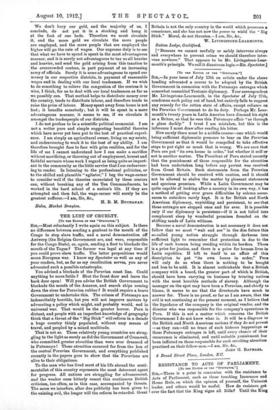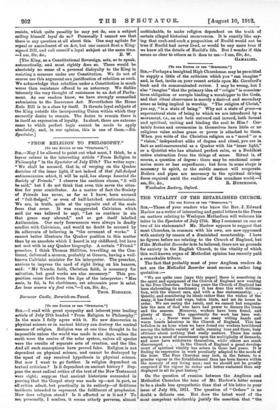RESISTANCE TO ACTS OF PARLIAMENT.
!To THE EDITOR OF THE "SPECTATOR."] SIR,—There is a point in connexion with the resistance to Acts of Parliament, such as those touching Insurance and Home Rule, on which the opinion of yourself, the Unionist leader, and others would be useful. How do resisters get over the fact that the King signs all Bills ? Until the King resists, which quite possibly he may yet do, can a subject calling himself loyal do so ? Personally I cannot see that there is any question at all about this. One may agitate for repeal or amendment of an Act, but one-cannot flout a King- signed Bill, and call oneself a loyal subject at the same time.
[The King, as a Constitutional Sovereign, acts, so to speak, automatically, and most rightly does so. There would be absolutely no sense of a personal disloyalty to the King in resisting a measure under our Constitution. We do not of course use this argument as a justification of rebellion as such. We acknowledge that rebellion under a Constitution is much worse than resistance offered to an autocracy. We dislike intensely the very thought of resistance to an Act of Parlia- ment. As our readers know, we have strongly counselled submission to the Insurance Act. Nevertheless the Home Rule Bill is in a class by itself. It thrusts loyal subjects of the King outside the incorporating Union within which they earnestly desire to remain. The desire to remain there is in itself an expression of loyalty. In short, there are extreme cases to which perfect logic cannot be made to apply absolutely, and, in our opinion, this is one of them.—Ea. Spectator.]



































 Previous page
Previous page